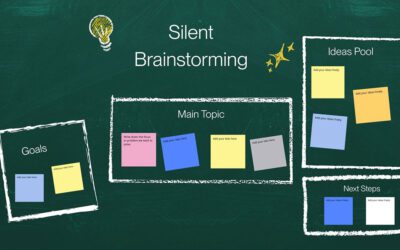A world saturated with noise
We live in an environment saturated with information, constant notifications, endless meetings, and a never-ending flow of visual and auditory stimuli. In the midst of this permanent noise, external and internal, silence has become a forgotten, the importance of silence has been lost. But it’s also one of the most powerful tools to regain clarity, focus, and well-being.
In the corporate context, where performance and decision-making are critical aspects, silence is not absence: it is strategy. It’s not about disconnecting to avoid responsibilities, but about creating intentional spaces where noise doesn’t dictate the direction of our thinking.
What do we understand as “noise” today?
Noise is no longer just an auditory stimulus. In the professional environment, it can be:
- Digital Noise: Messages, emails, collaborative platforms, and social media that interrupt every few minutes.
- Mental Noise: Recurring thoughts, anticipatory anxiety, accumulated stress.
- Cultural Noise: Pressure to respond quickly, to be “always available,” and to constantly show productivity.
This noise, though often subtle, fragments our attention, interrupts deep cognitive processes, and generates mental fatigue.
Silence as a focus tool
In a hyperconnected world, silence not only calms; it sharpens our ability to concentrate. Several neuroscientific studies have shown that moments of silence activate the brain’s default mode, a neural network key to memory consolidation, reflection, and creativity.
Why Is This Relevant at Work?
Because great ideas, quality decision-making, and innovation arise more easily in calm, unsaturated mental states. When silence (both internal and external) is allowed, the brain can process information more efficiently and connect ideas in non-linear ways.
The benefits and the importance of silence in the corporate environment
In a world where it seems the one who talks the most, replies the fastest, and has the busiest schedule is the one who “works best,” silence has been pushed into an uncomfortable corner. It’s associated with weakness, disinterest, disconnection. And yet, if one takes a moment to observe carefully, without notifications, without distractions, without that background buzz we barely even notice anymore, a different truth begins to reveal itself: silence is not absence; it is pure presence. It’s the space where ideas take shape without interference, where thoughts no longer have to compete for attention, and where decisions, far from urgency, can mature.
Most people spend their workday in a state of constant fragmentation. They jump from message to message, meeting to meeting, idea to idea. And in that speed, in that noise so often glorified as efficiency, what is truly lost is depth. Silence interrupts that pattern not to stop it, but to allow us to see more clearly where we actually want to go. When someone gives themselves permission to be in silence, even for a few minutes, something almost immediate happens: the body lets its guard down, the nervous system regulates, the mind stops being in defense mode, and attention, that much-coveted ability, becomes accessible again.
The real benefits
What’s interesting is that it’s not just about emotional well-being, though that alone would be reason enough. The benefits of silence are tangible in the areas that organizations care most about: better decision-making, focused productivity, and genuine creativity. Because when you’re not distracted trying to prove you’re “doing things,” you start doing what truly matters. Silence also changes the way we relate to others. Listening stops being a formality and becomes an active practice. We stop preparing our response while the other person is talking, and we begin, truly, to receive what they’re saying.
Collectively, silence is revolutionary too. A leader who knows how to pause communicates with more power than one who never stops talking. A team that allows silence, even in a meeting, shows trust in its own process. And a workplace culture that isn’t afraid of emptiness can begin to build from a much more human place.
How to incorporate silence into your workday
Thinking about incorporating silence into a workday seems, to many, almost like a fantasy. “I don’t have time,” “my job doesn’t allow it,” “it sounds nice, but it’s not realistic.” And yet, if we’re honest, what’s often missing is not time but permission. We struggle to accept that pausing is also moving forward. That stopping, even for five minutes, is a way of protecting the quality of what we do next. Silence, in this sense, is not a luxury; it’s an underestimated tool.
It’s not about turning your desk into a temple or meditating for three hours before replying to an email. It’s about simple gestures, almost invisible, yet deeply transformative. Like starting the day without checking your phone. Like sitting in silence to review your schedule before diving into the whirlwind of tasks. Like blocking off an hour in the morning, guilt free, to work on something that requires full focus, with notifications turned off and the phone out of reach. Not out of disinterest toward your team, but out of respect for your own capacity to concentrate.
And total silence isn’t necessary. What’s needed is intention and a moment not to be filled with stimuli you didn’t choose. It could be a five-minute walk without a podcast, a coffee while looking out the window without opening emails, or even a long breath between one meeting and the next. Sometimes we believe that for silence to be effective, it has to be radical. But the truth is, silence, when constant, even if brief, starts to reorganize the way we exist in the world.
The interpersonal dimension
Holding silence in the middle of a conversation doesn’t have to be uncomfortable. On the contrary, it can be the moment you truly listen. The other person feels that space, and often, they dare to say more. In meetings, in negotiations, even in casual conversations, silence can become a sign of respect and presence.
It’s not a habit you force all at once. It’s more of a return. To something that, if we’re honest, we’ve all experienced at some point: the clarity that arrives when the noise goes quiet, even if just for a moment.
Silence as a form of resistance
In a culture that glorifies noise, choosing silence is resisting constant urgency, the “always available” mindset, and exhaustion disguised as efficiency. It’s choosing quality over speed. Depth over volume.
Silence doesn’t disconnect you from the world: it connects you with yourself. And from there, you can lead, create, decide, and live with more intention.
What if silence were the beginning of your transformation?
At Silent Focus, we design transformative experiences for professionals and teams who need to disconnect from noise to reconnect with what matters. Our silent corporate retreats combine conscious breathing, regenerative leadership, contemplative practices, and digital-free spaces to access a clearer, more creative, and centered version of yourself.
Learn More
- Website: silentfocus.co
- Follow us on Instagram: @silentfocus.co





